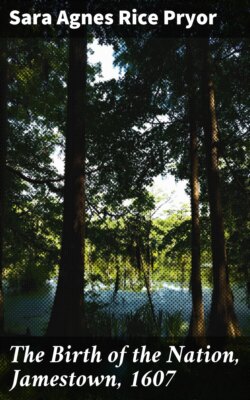Читать книгу The Birth of the Nation, Jamestown, 1607 - Sara Agnes Rice Pryor - Страница 8
На сайте Литреса книга снята с продажи.
CHAPTER VII
ОглавлениеTable of Contents
Hidden in a dense forest on the banks of the Pamunkey, was Uttamussac, the greatest temple in Powhatan's kingdom. In every territory governed by a "werowance" there were smaller temples and priests. Each of the petty rulers under the great emperor had his spiritual adviser—some priest or conjurer, wise in the sacred mysteries and beloved of the gods, from whose decisions in spiritual matters there was no appeal. According to the wealth of the werowance were the size and dignity of the temple, varying from a small arbour of twenty feet to a structure a hundred feet long. The door opened to the east, and there were pillars and windings within, with rude black images looking down the church to the platform of reeds; upon which, wrapped in skins, lay the skeletons of dead priests and kings. Beneath the platform, veiled with a mat of woven grasses, sat "Okeus," an ill-favoured black demon, well hung with chains of pearl and copper. He it was to whom children must be sacrificed, lest he blight the corn, or cause briers to wound the feet and limbs of travellers through the forests, or enemies to prevail, or women to be barren or false, or thunder and lightning to destroy. He it was who had been seen leaping through the corn-fields, crying "Ohé! Ohé!" just before some signal disaster. There was also a far-away, peaceable God, variously known as "Ahone" or "Kiwassa"—"The One All Alone." He too had once walked among them. Are there not gigantic footprints five feet apart on the rocks yet visible near Richmond at Powhatan? These are the footprints of the good god as he once strode through the land of the great chief. To him it was, of course, unnecessary to sacrifice, inasmuch as he was by nature benevolent. But he was not as powerful as Okeus—Okeus, who sternly held the scales of justice, and was to be placated by nothing short of their dearest and best, their precious, innocent little children.
The pious men who emigrated to Virginia within the first twenty years of its settlement firmly believed that Satan had here established his kingdom; that the priests were his ministers, inspired by him to threaten the people unless they held to the ancient customs of their fathers. It was remembered that in all ages of the world this arch-enemy of mankind had demanded human sacrifice from his followers,—from the times of the ancient Carthaginians, Persians, and Britons. Now, in Florida, he claimed the first-born male child, and in Mexico prisoners taken in war. The priests of Powhatan failed not to instruct the werowances that if the prescribed number of children were withheld, Okeus, who was sure to prevail in the end, would then be appeased only by a hecatomb of children. Nor would any sacrifice avert his wrath if a nation despising the ancient religion of their forefathers was permitted to inhabit among them, since their own god had hitherto preserved them and from age to age given them victory over their enemies.
The conversion, therefore, of the Indian was next to impossible, unless indeed the first step could be the destruction of priest and temple. Chanco and Pocahontas, and possibly Kemps, were for many years the only fruits of the labours of the missionaries. Taunted by the powers at home with this fact, the colonists retorted that they had sent many Indians to England, not one of whom returned converted to Christianity. The Indian chief Pepisco was long an object of hope at Jamestown, because of his apparently candid willingness to believe in the God of the Christian; but the utmost he could attain was a belief that the Indian gods were suitable for the Indian, but that the greater nation needed the greater God, for whose good offices he was willing to entreat through the white man.
Had the fate of the Indian been to live in peace and friendship with his white brother to this day, it is not probable he would have ever been at heart a Christian. Druidism long survived, though in obscurity and decay, the thunder of the imperial edicts. It did more than survive in Ireland—it flourished until the fifth century, when it fell before the Christian enthusiasm of St. Patrick. Long after the Druidical priesthood was extinct, Druidical superstitions, Druidical rites, were dear to the common people. Nor will they become utterly extinct until we cease to gather the mistletoe and forget the sports and pastimes at Hallowe'en.
So grim and mysterious was the principal temple at Uttamussac on the Pamunkey, that the trembling Indian in his canoe hurried past it with bated breath, solemnly casting into the waters pieces of the precious copper, puccoon, and strings of pearls. In this temple, and in two others beside it, were images of devils, and upon raised platforms the swathed skeletons of their greatest kings. The place was so holy that none but priests entered it. There they questioned Okeus and received verbal answers.
